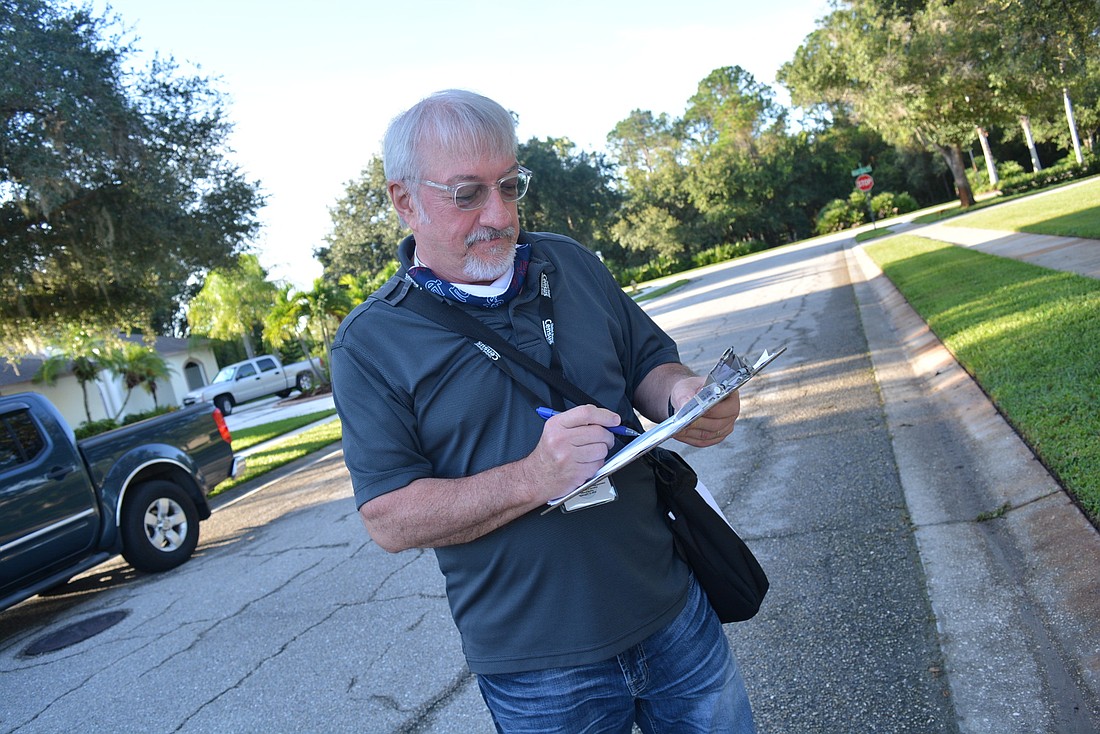- April 24, 2024
-
-
Loading

Loading

Although the temperature was in the 90s, Tara Preserve’s Andrew Armstrong didn’t mind being on the streets of East County.
Working as an enumerator for the U.S. Census Bureau isn’t for everyone — his team of 23 dwindled to eight in just two weeks — but Armstrong feels strongly about the task at hand.
“It is important,” he said of the census. “The main information [we collect] is, ‘How many people lived here April 1?’ That data is used
for the apportionment, federal funding for food and neighborhood grant programs and more.”
In his role, which started Aug. 11 and will end Sept. 30, Armstrong and other enumerators are tasked with tracking down information about residences that have not responded to the census survey. That information includes how many people live in the home and their ages.
“It’s important, if there’s children in the house, do we need more [funding] for schools?” Armstrong said. “That’s the idea. It helps determine where federal money is being spent in each community.”
Each morning, Armstrong receives a list of addresses where he must go that day. With his census satchel and clipboard, he knocks at each property one at a time. The ones he visits have not yet responded to the survey.
If someone is home, he can complete the census survey. It only takes five to 10 minutes.
If the residents are not home, he leaves a note, called a “notice of visit,” and marks it in his device. The note encourages the resident to complete the survey, which is required by law.
Each nonresponsive home will be visited three times. For those that appear vacant, he has to find neighbors with knowledge about the property and record any information possible.
Marilyn Stephens, the assistant regional census manager for the U.S. Census’ Atlanta region, which includes Alabama, Florida, Georgia, Louisiana, Mississippi, North Carolina and South Carolina, said the census process began March 12, right as the COVID-19 pandemic began.
Many of the public outreach efforts planned were put on hold, and the outbreak has resulted in lower participation than before, as well.
“People have multiple priorities,” Stephens said. “Other things were top of mind. We were all forced to adapt to virtual outreach.”
As of Aug. 11, census workers were out again, pounding on doors and canvassing areas where responses were needed.
Stephens said getting that information is critical because data from the census determines state representation in Congress, as well as future boundary lines for congressional, state and even local government seats, in some cases.
It also helps determine how $675 billion in federal funding is distributed to states for various programs and projects, such as highway construction and planning, Medicaid, Medicare, children’s health insurance, education, social services, unemployment benefits, supplemental nutrition programs (like WIC) and affordable housing.
“It’s real money,” Stephens said. “We get this once-a-decade reset. These programs are important to every community. We have to convince people to take these 10 minutes to ensure these people have the resources they need over the next 10 years.”
President Donald Trump will receive census data at the end of December, and then Congress will begin its redistricting process for each state in March 2021.
Debbie DeLeon, neighborhood connections division manager for Manatee County, said the census brings money to the county and also is a resource on demographics and other information for local businesses and businesses looking to come to the area.
“It behooves all of us to get the highest count and the accurate count,” DeLeon said.
She said that although census responses in the Lakewood Ranch area are high — most Lakewood Ranch ZIP codes are reporting response rates between 62% to 85% — people should talk about the census to those who still need to complete the survey.
“It matters,” she said. “It matters in all aspects for Manatee County — for funding, for business.”
Manatee County Public Outreach Coordinator Nicholas Azzara said those with second homes should be sure to respond to the census for all properties they own, as well.